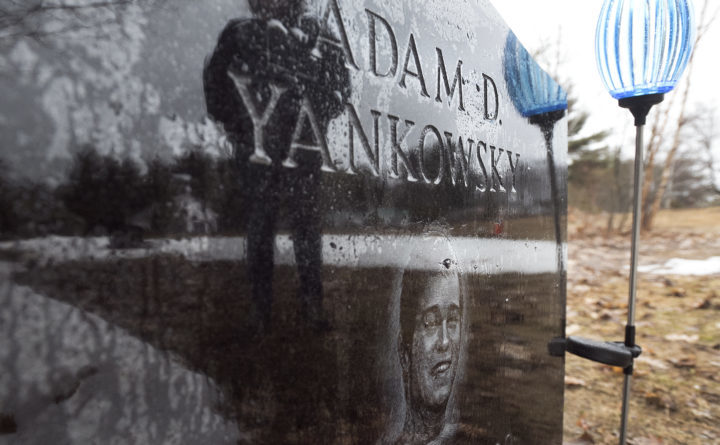Overdoses are killing too many of Maine’s children.

GLENBURN, MAINE 04/18/2018 Shelly Yankowsky is reflected in her son's gravestone in Glenburn. Shellys son Adam Yankowsky died in August 2017 of a drug overdose. Yankowsky, the Rev. Frank Murray, first responders and law enforcement officers have joined together to plan a healing service for those impacted by the Bangor area's opioid addiction crisis. The service will be held on April 25 at St. John Catholic Church in Bangor. Gabor Degre | BDN
Adam Yankowsky died last August of a drug overdose. Last year in our small state, 418 people like Adam died of a drug overdose. They were our sons, daughters, fathers, friends, mothers and co-workers. The opioid crisis has been declared a national public health emergency, with 42,249 deaths from opioid overdoses in 2016.
Here in Maine that came as no surprise. We’ve witnessed our children dying. And they are dying all over the country, with opioid overdoses fueling a two-year drop in U.S. life expectancy. This disease is stealing our children. It is the rare person today in our state who has not been touched by this epidemic.
I was honored to be part of a unique interfaith healing service in Bangor in April. The service was one part of a local initiative organized by law enforcement, health care workers, addiction specialists, first responders and clergy. Our idea was to harness the great strength that resides in Maine’s faith communities by bringing them together for a community healing service. We asked every faith community to speak about addiction and provided them with an information sheet listing where they and their families could go for help.
By addressing the issue in places of worship, we can break down the shame and stigma that keep users from getting the help and support they so desperately need.
Our faith communities can help lead us out of this crisis by simply speaking more about opioid drug use. That simple act, speaking publicly about this disease, can begin to clear a path both for people struggling with drug use and their families to get help.
A similar historic example is the improvement in the treatment of HIV. Once the shame and stigma of gay lifestyles was overcome, scientific and medical knowledge accumulated at an accelerating rate leading to the development of effective therapies. Similarly, by learning about addictive drugs and the disease of opioid drug dependency and challenging the way we view opioid users — what some call our modern-day lepers — we can begin to move this mountain.
I was at Adam’s funeral last August. It was one of several I had attended in 2017 of young people who died of an overdose.
His parents, Shelly and Dave Yankowsky, stood up to shame, stigma and guilt, and publicly shared the story of their struggle with Adam’s addiction and ultimate death. In doing so, they put a face to 418 of Maine’s other children who died last year. In sharing their son’s life with us, he became everyone’s son. They are the bravest people I know.
In the face of such unspeakable sadness, it is understandable that we become overwhelmed and inaction sets in. We may tell ourselves the solutions to this epidemic are the sole purview of the police, health care workers, the courts, jails or government.
But the 418 Mainers who died last year were our children, not the government’s. More die each day. We must act.